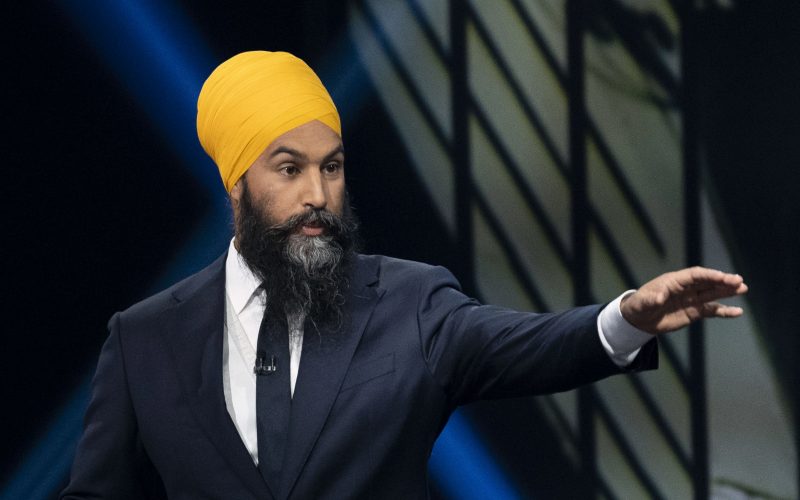Is it possible to accurately gauge the financial standing of a public figure, especially when the figures bandied about seem too good to be true? The reported net worth of Jagmeet Singh, the leader of the New Democratic Party (NDP), at a staggering $78 million, presents a complex case study in the intersection of politics, personal wealth, and public perception.
The very mention of such a substantial sum immediately ignites a firestorm of questions and skepticism. The narrative, often fueled by the internet, paints a picture of a man seemingly far removed from the everyday struggles of the average Canadian. The juxtaposition of this reported wealth with Singh's political platform, which often champions policies aimed at wealth redistribution, adds another layer of intrigue. This situation, of course, is exacerbated by the echo chambers of social media, where unsubstantiated claims and misinformation can quickly gain traction, further muddying the waters of truth and reality. There are whispers of private schooling, expensive vehicles, and designer attire all elements that, when combined, create a disconnect between the leader and the constituents he purports to represent. At this point, it is important to note that there is no definitive proof for any of these allegations. However, the question persists: how does one reconcile a perceived image of wealth with a political stance rooted in social justice and economic equality?
| Full Name | Jagmeet Singh |
| Date of Birth | January 2, 1979 |
| Place of Birth | Scarborough, Ontario, Canada |
| Political Party | New Democratic Party (NDP) |
| Current Position | Leader of the New Democratic Party (since 2017) |
| Education | University of Western Ontario (B.A. in Biology), Osgoode Hall Law School (J.D.) |
| Profession | Politician, Lawyer |
| Reported Net Worth | Approximately $78 million (Sources vary; subject to debate) |
| Salary as Political Leader | $271,700 (Approximate) |
| Key Policies | Healthcare, Climate Change, Social Justice, Wealth Tax |
| Spouse | Gurkiran Kaur Sidhu |
| Member of Parliament | Burnaby South (2019-2025) |
| Reference Website | Parliament of Canada |
The complexities of evaluating Singh's financial standing become further complicated by the nature of such estimations. The figure of $78 million, if accurate, would encompass various sources of income and assets. These likely include, but are not limited to, his political salary, income from any book royalties as his memoir would surely generate a sizable revenue stream and other investments. However, the precise details of his financial portfolio are not fully public. The media outlets, such as Forbes or other financial news platforms, use complex methodologies to determine such estimates, and it is essential to acknowledge the inherent uncertainties associated with these calculations.
Furthermore, the very nature of the political arena can make it difficult to separate perception from reality. Public figures are constantly scrutinized, and their lives are often subject to intense media coverage and public interest. In this environment, rumors can quickly circulate, especially in the fast-paced digital age. One of these include the false reports about a mansion in the sum of $5.5 million that was rumored and spread in the media, these reports are clear indication that the truth can be subject to change, and it might take time to find the reality.
Singh's political journey began in Ontario, where he served as a Member of Provincial Parliament before rising to the national stage. The trajectory of his career, from his early days as a lawyer to his current position as the leader of the NDP, paints a picture of a dedicated individual. He has spoken of the significance of hard work and compassion, and his policies often address issues like income inequality and social justice. This raises a crucial question: Does a leader's personal wealth, regardless of its size, automatically disqualify them from effectively representing the needs and concerns of everyday Canadians? Singh has, in several instances, advocated for policies such as a one percent wealth tax on individuals with assets of $10 million or more. The underlying principles of such a proposal seem to clash with the reported information regarding his own wealth, which is a sensitive political issue.
The interplay of perception, policy, and personal wealth is not unique to Singh's case. The internet is awash with opinions and speculation regarding the financial standing of public figures. The situation is even more difficult in times of economic insecurity and social unrest. In such an environment, the gap between the "haves" and the "have-nots" becomes particularly pronounced. This can lead to greater scrutiny of those perceived to be part of the elite. The fact that Singh attended private school, owns luxury vehicles, and often appears in expensive clothing immediately sets him apart from the average individual. In addition to this, the fact that he is keeping Justin Trudeau in power in exchange for a pension has raised several eyebrows among the media.
The internet's collective memory and the echo chambers of social media further complicate matters. The lack of comprehensive and verified information can contribute to a skewed understanding of any situation. The information often presents incomplete information. For example, it is difficult to obtain an accurate picture of Singh's financial assets. The lack of full disclosure of the politician's financial information can add to uncertainty. However, there are significant ethical considerations involved in demanding full financial transparency. Public figures have a right to their privacy.
The ongoing debate surrounding Singh's net worth underscores the importance of critical thinking, especially in the age of easily accessible information. It is crucial to examine the sources of information, evaluate the evidence, and avoid jumping to conclusions based on speculation. The facts surrounding Singh's wealth, and indeed the wealth of any public figure, can and should be thoroughly investigated. The ultimate test of any political leader lies not only in their personal circumstances, but also in their ability to serve the public interest.
The complexities of this are a reminder that politics is a complex undertaking, and perception often plays a significant role. It is essential to separate fact from fiction and avoid succumbing to the influence of misinformation and gossip. The question of Singh's wealth continues to be the subject of public debate, highlighting the intricacies and challenges that define the intersection of politics and personal finances.


